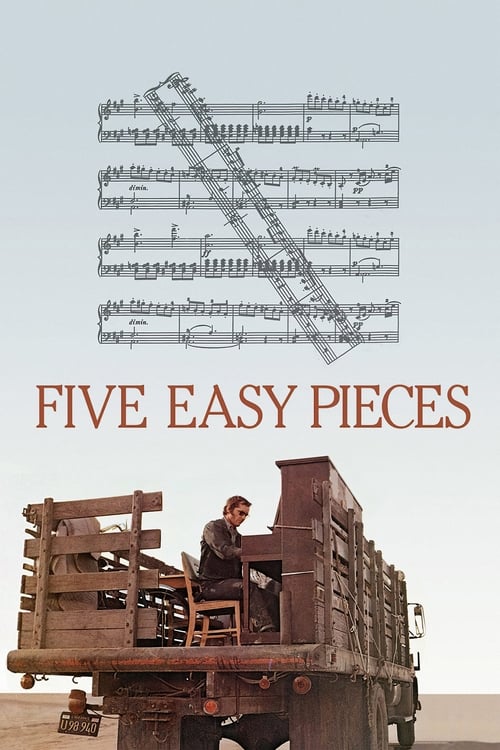
Title: Five Easy Pieces
Year: 1970
Director: Bob Rafelson
Writer: Carole Eastman
Cast: Jack Nicholson (Robert Eroica Dupea),
Karen Black (Rayette Dipesto),
Susan Anspach (Catherine Van Oost),
Lois Smith (Partita Dupea),
Ralph Waite (Carl Fidelio Dupea),
Runtime: 98 min.
Synopsis: A drop-out from upper-class America picks up work along the way on oil-rigs when his life isn't spent in a squalid succession of bars, motels, and other points of interest.
Rating: 7.129/10
A Restless Soul in a Still Frame: The Unquiet Art of *Five Easy Pieces*
/10
Posted on July 16, 2025
Bob Rafelson’s Five Easy Pieces (1970) is a cinematic elegy for the restless, a film that captures the ache of dislocation through Bobby Dupea’s (Jack Nicholson) fractured existence. Rafelson, alongside screenwriter Carole Eastman, crafts a narrative that doesn’t so much unfold as unravel, revealing a man caught between worlds blue-collar oil fields and the refined air of his musical family. The film’s power lies in its refusal to resolve this tension, instead letting it simmer in Nicholson’s coiled, magnetic performance. His Bobby is a study in contradictions: a prodigy pianist turned drifter, charming yet cruel, yearning for authenticity while sabotaging connection. Nicholson’s delivery those sharp glances, the sardonic grin conveys a man who knows he’s his own worst enemy but can’t stop running.
The screenplay is the film’s backbone, spare yet incisive, with dialogue that cuts like a quiet knife. Eastman’s script avoids melodrama, letting subtext carry the weight of Bobby’s alienation. Scenes like the diner sequence, where Bobby’s attempt to order off-menu toast becomes a rebellion against petty authority, are both darkly funny and profoundly revealing. Yet, the script occasionally stumbles in its female characters, particularly Rayette (Karen Black), whose clingy vulnerability borders on caricature. While Black imbues her with heartbreaking sincerity, the writing risks reducing her to a foil for Bobby’s angst, a flaw that dims the film’s otherwise sharp character study.
Cinematographer László Kovács elevates the mundane into the poetic, framing the Pacific Northwest’s oil rigs and foggy highways with a stark beauty that mirrors Bobby’s inner desolation. The camera lingers on empty spaces diner counters, motel rooms making them as expressive as the actors. The use of classical music, from Chopin to Bach, juxtaposed with Tammy Wynette’s country twang, underscores Bobby’s cultural schizophrenia, though the score sometimes feels heavy-handed, telegraphing emotions the visuals already convey.
Rafelson’s direction is understated yet deliberate, allowing silences to speak louder than words. The film’s final shot a long, unbroken take of Bobby’s impulsive escape haunts with its ambiguity, leaving viewers to wrestle with their own interpretations of freedom and failure. Five Easy Pieces doesn’t judge its protagonist; it simply holds a mirror to his chaos, inviting us to see our own restlessness reflected back. Its imperfections, like Bobby himself, are what make it enduringly human.
0
0
